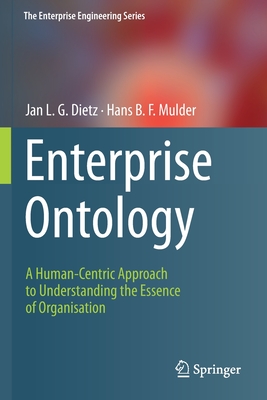Enterprise Ontology: A Human-Centric Approach to Understanding the Essence of Organisation
暫譯: 企業本體論:以人為中心的組織本質理解方法
Dietz, Jan L. G., Mulder, Hans B. F.
- 出版商: Springer
- 出版日期: 2021-04-23
- 售價: $5,930
- 貴賓價: 9.5 折 $5,634
- 語言: 英文
- 頁數: 465
- 裝訂: Quality Paper - also called trade paper
- ISBN: 3030388565
- ISBN-13: 9783030388560
-
相關分類:
GAN 生成對抗網絡
海外代購書籍(需單獨結帳)
商品描述
Enterprise ontology is one of the conceptual pillars of enterprise engineering, next to enterprise design and enterprise governance, together accomplishing the goals of intellectual manageability, organisational concinnity and social devotion. By revealing the essence of an enterprise's organisation, enterprise ontology addresses business processes, data and rules in a fundamental and truly integrated way. In addition, it provides deep insight into and broad overview over complex organisational transformations.
The book is divided into three parts. Part A is an introduction in enterprise engineering and enterprise ontology. Part B explores the theories underlying enterprise ontology, explaining the foundations of each theory, the elaborations in practical methods and techniques, and the relationships with other comparable approaches. Part C presents the practical application of the theories. It includes a comprehensive summary of the DEMO methodology and the DEMO specification language, as well as exercises and applications of DEMO in various business areas. It also features a chapter on combining DEMO with comparable approaches to modelling business processes, data and rules, to the benefit of the latter.
Discussing the theoretical foundations of enterprise ontology and its practical applications in equal measure, this book is the principal textbook in courses on enterprise engineering. Since it unites elements from management science and information systems engineering, it is also relevant to students and professionals in either field.
The book is divided into three parts. Part A is an introduction in enterprise engineering and enterprise ontology. Part B explores the theories underlying enterprise ontology, explaining the foundations of each theory, the elaborations in practical methods and techniques, and the relationships with other comparable approaches. Part C presents the practical application of the theories. It includes a comprehensive summary of the DEMO methodology and the DEMO specification language, as well as exercises and applications of DEMO in various business areas. It also features a chapter on combining DEMO with comparable approaches to modelling business processes, data and rules, to the benefit of the latter.
Discussing the theoretical foundations of enterprise ontology and its practical applications in equal measure, this book is the principal textbook in courses on enterprise engineering. Since it unites elements from management science and information systems engineering, it is also relevant to students and professionals in either field.
商品描述(中文翻譯)
企業本體論是企業工程的概念支柱之一,與企業設計和企業治理並列,共同實現智慧可管理性、組織和諧性及社會奉獻的目標。透過揭示企業組織的本質,企業本體論以根本且真正整合的方式處理商業流程、數據和規則。此外,它還提供了對複雜組織轉型的深刻洞察和廣泛概覽。
本書分為三個部分。A部分是企業工程和企業本體論的介紹。B部分探討企業本體論的理論基礎,解釋每個理論的基礎、實用方法和技術的詳細說明,以及與其他可比方法的關係。C部分展示了這些理論的實際應用,包括對DEMO方法論和DEMO規範語言的綜合總結,以及DEMO在各個商業領域的練習和應用。它還包含一章,探討將DEMO與可比方法結合以建模商業流程、數據和規則的好處。
本書在理論基礎和實際應用方面進行了平衡的討論,是企業工程課程的主要教科書。由於它結合了管理科學和資訊系統工程的元素,因此對於這兩個領域的學生和專業人士也具有相關性。
作者簡介
Jan L.G. Dietz is Emeritus Professor at Delft University of Technology, and Visiting Professor at the University of Lisbon and the Czech Technical University in Prague. He is the spiritual father of DEMO (Design & Engineering Methodology for Organisations), one of the founders of the Enterprise Engineering Institute, and the founder of the Ciao! Enterprise Engineering Network. His academic work has always focused on applying research outcomes in practice.
Hans B.F. Mulder is an entrepreneur and founder of Viagroep nv, Research Director at the Standish Group, Executive Professor at the Antwerp Management School and lecturer at the Police Academy of the Netherlands. He is regularly engaged as an IT expert when conflicts between companies need to be resolved in or out of court, such as participating in arbitration, mediation and expert reports.
Hans B.F. Mulder is an entrepreneur and founder of Viagroep nv, Research Director at the Standish Group, Executive Professor at the Antwerp Management School and lecturer at the Police Academy of the Netherlands. He is regularly engaged as an IT expert when conflicts between companies need to be resolved in or out of court, such as participating in arbitration, mediation and expert reports.
作者簡介(中文翻譯)
Jan L.G. Dietz 是代爾夫特科技大學的名譽教授,同時也是里斯本大學和布拉格捷克科技大學的客座教授。他是DEMO(組織設計與工程方法論)的精神之父,也是企業工程研究所的創始人之一,以及Ciao! 企業工程網絡的創始人。他的學術工作始終專注於將研究成果應用於實踐中。
Hans B.F. Mulder 是企業家及Viagroep nv的創始人,Standish Group的研究總監,安特衛普管理學院的執行教授,以及荷蘭警察學院的講師。他經常作為IT專家參與解決公司之間的衝突,無論是在法庭內外,例如參與仲裁、調解和專家報告。



















